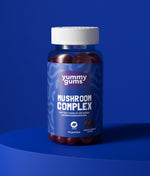New: Magnesium Lemonade
Nieuws
Magnesium plays a vital role in our daily functioning. It's the hidden power behind many important processes in our body. For example, it supports the functioning of our muscles and nervous system. But are we getting enough of it?
Yummygums is launching a delicious thirst quencher: Magnesium Lemonade . It's high-strength, with magnesium citrate . This makes it even easier to support your body! We'll tell you everything you need to know in this blog post.
What is magnesium?
Magnesium is a mineral essential for various bodily functions. It plays a role in over 300 reactions in your body. Because our bodies cannot produce magnesium on their own, this mineral must be absorbed through food. This process takes place in the last part of the small intestine.
What does magnesium do in your body?
Bones and teeth
One of magnesium's most well-known functions is in your bones and teeth. About half of the magnesium in our body is found in bones. Along with calcium, phosphorus, manganese, zinc, vitamin D, and vitamin K, it contributes to the maintenance of normal bones. It's also important for building and maintaining strong teeth.
Muscle function
Magnesium is beneficial for muscle function. This mineral helps maintain supple and strong muscles. It's therefore an important mineral for anyone who is physically active, from recreational athletes to elite athletes.
Nervous system
Magnesium plays a role in the transmission of impulses between (nerve) cells. This means it helps transmit nerve impulses between the brain and the rest of the body.
Nerve impulses are important for your body because they allow it to perceive things like movement, pain, touch, and heat. Nerve impulses also control your muscles when you want to move your body.
Energy production and reduction of fatigue
Magnesium is important for energy metabolism. This mineral helps release energy from fat, carbohydrates, and proteins. Magnesium can also be used to treat fatigue and lethargy, as it can help reduce energy deficiency.
Electrolyte balance
Magnesium helps maintain the body's normal water and mineral balance.
Electrolytes, such as sodium, potassium, and calcium, are necessary to maintain the balance of fluids inside and outside cells. These are involved in regulating blood pressure, fluid balance, and the function of muscle and nerve cells.
Psychological function
Magnesium not only contributes to a clear mind but also benefits concentration, memory, and learning performance. It also contributes to brain and nerve functions involved in reasoning.
What does magnesium contain?
Because the body cannot produce magnesium itself, you must get it from food or supplements. Magnesium is found in various foods.
Nuts and seeds :
Almonds, cashews, pumpkin seeds and sunflower seeds all contain high amounts of magnesium.
Green leafy vegetables :
Spinach, kale, and other dark green vegetables are also good sources.
Whole grain products :
Whole wheat bread, oatmeal, quinoa and brown rice are rich in magnesium.
Legumes :
Beans, lentils and chickpeas also provide a significant amount.
Fish :
Salmon, mackerel, and tuna are good choices for increasing your magnesium intake.
Bananas and avocados :
These fruits are not only rich in potassium, but also contain a good amount of magnesium.
Magnesium absorption from food varies between 20 and 60 percent, depending on the amount of magnesium in the food. Not everyone gets the recommended daily amount of magnesium. This is usually due to a diet low in magnesium-containing foods, but an increased magnesium requirement can also play a role. In that case, a supplement can be a solution.
How much magnesium per day?
The recommended daily allowance of magnesium is 300 mg for women and 350 mg for men. This can be increased if you have an active lifestyle, for example. While many people get enough magnesium through their diet, others, for example, due to a limited diet or increased dietary needs, don't achieve these amounts. In such cases, a magnesium supplement, such as magnesium powder or a magnesium gummy , can be a convenient solution.
What is magnesium citrate?
Magnesium citrate is a type of magnesium combined with citric acid, making it more easily absorbed by the body. Therefore, increasing your daily magnesium intake can be helpful.
Yummygums Magnesium Lemonade
Yummygums Magnesium Lemonade is a sugar-free powdered supplement with the easily absorbable form of magnesium, citrate, and berry flavor. This Magnesium Lemonade is specially formulated to support muscle function.
Our magnesium powder is easily soluble, allergen-free, and contains no artificial colors or flavors. It also contains only 10 kcal per serving. It's also highly concentrated, containing 250 mg per serving. This represents approximately 67% of the recommended daily allowance.
Curious? Try it now!






































